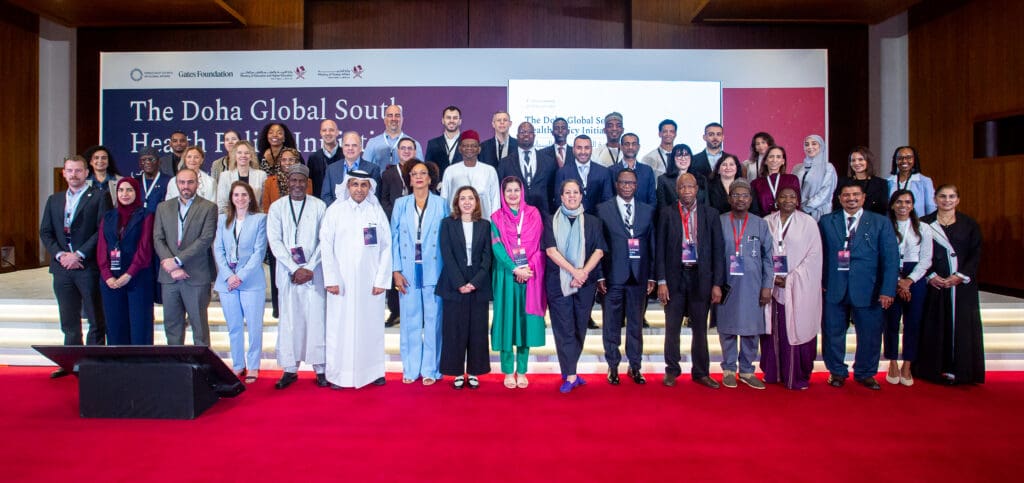Doha, Qatar – October 15, 2025 – Twenty-one senior public health officials, policymakers, and experts from across the Global South gathered in Doha from October 13 to 15 for the second annual Doha Global South Health Policy Initiative (DGSHPI), held at the Sheraton Grand Hotel.
Hosted by the Middle East Council on Global Affairs (ME Council) in partnership with the Gates Foundation, and supported by Qatar’s Ministry of Foreign Affairs and Ministry of Education and Higher Education, the three-day event focused on strengthening regional cooperation and advancing inclusive, resilient health systems.
The convening concluded on October 15 with a high-level public panel titled: “Reimagining Global Health Financing: Priorities and Integration in the Global South.” In her opening address, Her Excellency Dr. Maryam bint Ali bin Nasser Al-Misnad, Minister of State for International Cooperation at the Ministry of Foreign Affairs, reaffirmed that this initiative holds special significance for the State of Qatar, as it embodies its vision for cooperation, innovation, and collective responsibility in promoting global health.”
She added, “When Qatar supported the launch of this initiative, it was driven by a firm belief that countries of the Global South should not remain mere recipients of policies, but rather partners in shaping them, active in developing their own solutions, and with a strong voice in the global dialogue on the future of health.”
Dr. Khaled AlJaber, Executive Director of the Middle East Council on Global Affairs, explained in his welcoming remarks that the session today, titled “Reimagining Global Health Financing, “reflects our shared commitment to building more sustainable and equitable health systems.
At a time when countries across the Global South are undergoing profound shifts in how healthcare is financed, it is essential to place people at the heart of every discussion, ensuring no one is left behind and that the benefits of development reach every home, village, and city.
The Middle East Council on Global Affairs views the Doha Initiative as more than just a platform for dialogue; it is a sincere humanitarian message and a bridge of cooperation and goodwill between the Global South, the Middle East, and the wider world. It affirms that the most effective policies are those rooted in compassion, knowledge, and genuine partnership.”
Panelists included Sheikha Haya Abdulrahman Al Thani, Deputy Director General for the Planning Sector at Qatar Fund for Development (QFFD), Dr. Muyi Aina, Director General of Nigeria’s National Primary Healthcare Development Agency; and Mrs. Magdalena Robert, Deputy Director of Advocacy and Communications at the Gates Foundation. The panel was moderated by Dr. Theresa Madubuko, Lead of the DGSHPI.
During the discussion, panelists explored the shifting landscape of global health financing and shared practical insights. Ms. Magdalena Robert discussed how the Gates Foundation is fully committed to reducing child and maternal mortality, elimination of infectious diseases and ending extreme poverty in the next 20 years. She shared how the Foundation believes that not one country or organization can do this alone and joint partnerships are needed to make the change we need to improve the lives and wellbeing of the most vulnerable.
Dr. Muyi Aina discussed Nigeria’s efforts to sustain large-scale health programs amid fiscal pressures, including strategies to mobilize domestic resources, engage the private sector, and adopt innovative service delivery models such as digital health solutions and community health worker programs.
Speaking from a donor perspective, Sheikha Haya Abdulrahman Al Thani reaffirmed the Qatar Fund for Development’s commitment to delivering rapid humanitarian assistance while advancing long-term, sustainable development that enhances national health systems. She emphasized the growing leadership of Gulf donors in driving scalable and innovative financing models that transcend traditional aid frameworks and are anchored in national priorities and local ownership. She also reflected on QFFD’s partnership-driven approach, highlighting impactful collaborations across the public, private, and philanthropic sectors that have enabled countries across the Global South to sustain access to essential health services, strengthen system resilience, and advance inclusive, sustainable development.
As the lead of the DGSHPI, Theresa Madubuko concluded by emphasizing that innovation and integration can help countries achieve more with fewer resources. “Partnerships must reinforce rather than dilute national priorities, and South-South collaboration offers powerful pathways for sustainable reform,” she noted.
Since its launch in 2024, this international initiative has become a unique platform for exchanging expertise and knowledge among Global South countries, enhancing technical cooperation, and promoting collective action to address shared health challenges. The convening program included closed sessions led by participating countries, as well as training workshops aimed at addressing national health challenges. These sessions will focus on exploring sustainable health financing pathways in light of changes in donor landscapes, building trust, and improving communication effectiveness in the health sector.
For media requests:
Suzanne El Houssari, Communications Director, ME Council shoussari@mecouncil.org

